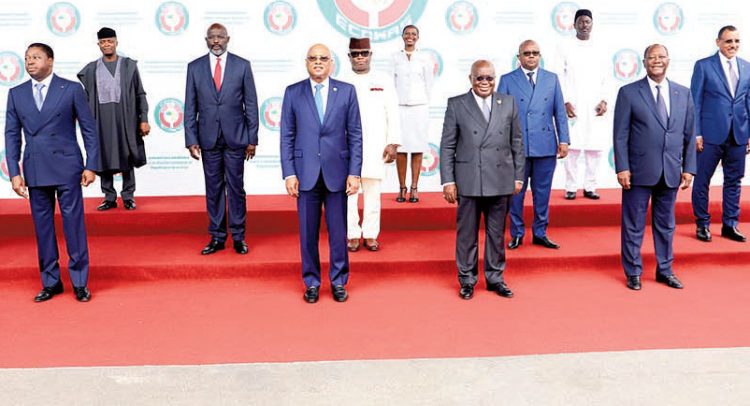ECOWAS Leaders
THE ECONOMIC Community of West African States (ECOWAS) has decided to send a military force to Guinea-Bissau to go and help stabilise that country.
The decision was taken at its extraordinary summit held Thursday in Accra.
This was after the highest decision-making body of the sub-regional group, the Authority of Heads of State and Governments received briefing from the Senior Minister of Foreign Affairs, International Cooperation and the Diaspora of Guinea-Bissau, Suzi Carla Barbosa, on the circumstances surrounding the attempted coup d’état in that country on February 1, 2022.
The authority condemned the attempted coup d’état in Guinea-Bissau and expressed solidarity with President Umaro Sissoco Embalo and his countrymen.
“In view of these recent developments, the authority decides to deploy a force with a view to supporting the stabilisation of the country,” a communiqué issued after the summit indicated.
The authority has further decided to maintain the military and police components of the ECOWAS Mission in The Gambia (ECOMIG) to consolidate stability in that country too.
It has since reaffirmed its commitment to stand firm for the protection of democracy and freedom in the region and reiterated its resolute stance to upholding the principle of zero tolerance for ascension to power, through unconstitutional means, as enshrined in the 2001 ECOWAS Supplementary Protocol on Democracy and Good Governance.
Burkina Faso
On the political situation in Burkina Faso, it took note of the deterioration of the security and humanitarian situation in that country, which calls for a quick return to constitutional order to deal effectively with the issues.
The authority reiterated its absolute condemnation of the coup d’état of January 24, 2022 and expressed concern over the continuous detention of President Roch Marc Christian Kabore.
In this regard, and subject to sanctions, it has demanded the unconditional release of President Roch Marc Christian Kabore.
It, however, upheld the suspension of Burkina Faso from all ECOWAS institutions until the restoration of constitutional order, and asked the military authorities to establish the transition institutions, adopt a transition calendar and facilitate the return to constitutional order, as soon as possible.
The authority has, however, instructed the ECOWAS Commission to ensure continuous engagement with the new authorities through the establishment of a monitoring mechanism, including the African Union and United Nations, with a view to accompanying the transition process.
Guinea
With regard to the situation in Guinea, the authority took cognisance of the recent establishment of the National Transition Council (CNT), as the legislative body.
That notwithstanding, the authority expressed concern over the unavailability of the required transition calendar five months after the coup d’état, as requested by the Extraordinary Session of the ECOWAS Authority of Heads of State and Government held on September 16, 2021.
Consequently, it has resolved to, as it were, “Uphold all the sanctions already imposed on Guinea, request the Transition Authority to provide ECOWAS an acceptable timetable for restoring constitutional order, and re-affirm its readiness to accompany Guinea towards the speedy return to constitutional order.”
Mali
In the case of Mali, the authority welcomed the conclusions of the 1057th meeting of the Peace and Security Council (PSC) of the African Union held on January 14, 2022 endorsing all the ECOWAS decisions and sanctions on Mali.
It, however, expressed regrets over the unavailability of a new timetable in line with the decisions of the authority and, therefore, decided to uphold all the sanctions imposed on Mali in line with its decision of January 9, 2022, urged the Malian authorities to urgently propose an acceptable electoral timetable to ECOWAS, with a view to enabling the progressive lifting of the sanctions.
ECOWAS has, however, reaffirmed its readiness to work in conjunction with the African Union and the United Nations to provide the necessary technical support to the authorities in Burkina Faso, Guinea and Mali to implement the approved timetables.
Worry
It, however, raised concern over the breach of constitutional order in the region, notably, with the recent military coup d’états and attempted coup d’état in some member states.
The authority has since re-affirmed its commitment to strengthen democracy, freedom and good governance in the region and instructed the ECOWAS Commission to expedite the review of the 2001 Supplementary Protocol on Democracy and Good Governance, and the related legal instruments.
BY Charles Takyi-Boadu


